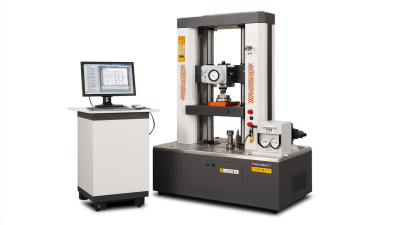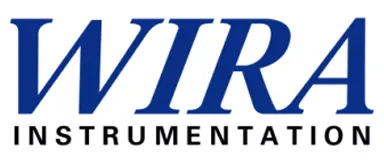Why Investing in a Tensile Tester Can Transform Your Quality Control Process
In today's competitive manufacturing landscape, ensuring superior product quality is paramount, and investing in a tensile tester can significantly enhance your quality control processes. According to a recent industry report by MarketsandMarkets, the global materials testing market is projected to reach $5.43 billion by 2027, driven by an increasing demand for high-quality products across various sectors. A tensile tester provides critical insights into the mechanical properties of materials, allowing manufacturers to detect weaknesses and optimize production processes effectively. With the ability to measure tensile strength, elongation, and other fundamental properties, these devices are essential in maintaining compliance with industry standards and improving overall product reliability. By integrating a tensile tester into your quality control toolkit, you can not only ensure product excellence but also reduce material waste and enhance operational efficiency, ultimately leading to greater customer satisfaction and profitability.

The Importance of Tensile Testing in Modern Manufacturing Industries
Tensile testing plays a crucial role in quality control across modern manufacturing industries, ensuring that materials meet the required strength and durability standards. By subjecting materials to controlled tensile stress, manufacturers can assess their tensile strength, yield strength, and elongation at break. This data is essential for determining if materials can withstand the demands of their intended applications, ultimately minimizing the risk of product failure in the field.
Moreover, the integration of a tensile tester into quality control processes enhances efficiency and precision. With real-time data collection, manufacturers can quickly identify inconsistencies or defects in their materials, enabling immediate corrective actions. This proactive approach not only improves product quality but also reduces waste and operational costs. As industries become increasingly competitive, investing in advanced tensile testing equipment is not just a choice but a necessity for ensuring operational excellence and maintaining customer satisfaction.
Impact of Tensile Testing on Quality Control
Understanding the Role of Tensile Testers in Quality Assurance Protocols
In the realm of quality assurance protocols, tensile testers play a pivotal role in ensuring the reliability and integrity of materials used in various industries. These machines provide critical data on material strength, ductility, and elasticity, which are essential parameters in the production and evaluation of products. According to recent industry reports, organizations utilizing advanced tensile testing machines experience a 30% reduction in material failure rates. This improvement not only enhances product quality but also leads to significant cost savings associated with recalls and replacements.
With the advancements in technology, particularly artificial intelligence and automation, the role of tensile testers has evolved. Smarter testing machines enable real-time data analysis and improved measurement accuracy, which are vital in the stringent quality standards of sectors like pharmaceuticals. For example, the integration of automated tensile testing solutions has been shown to streamline validation processes, ensuring consistency in results and compliance with regulatory requirements. As the industry continues to embrace these innovations, the potential for enhanced quality control processes is immense, positioning tensile testers as indispensable assets in the quality assurance framework.
Key Industry Statistics on Material Failure Rates and Quality Control
 Material failure rates pose a significant challenge across various industries, leading to considerable financial losses and safety concerns. According to industry research, nearly 30% of products fail quality assurance tests due to material defects, which emphasizes the critical need for robust quality control measures. In sectors such as aerospace and automotive, the consequences of material failure can be catastrophic, making the investment in advanced testing equipment indispensable.
Material failure rates pose a significant challenge across various industries, leading to considerable financial losses and safety concerns. According to industry research, nearly 30% of products fail quality assurance tests due to material defects, which emphasizes the critical need for robust quality control measures. In sectors such as aerospace and automotive, the consequences of material failure can be catastrophic, making the investment in advanced testing equipment indispensable.
Integrating a tensile tester into the quality control process allows businesses to obtain precise measurements of material strength and ductility. This testing method not only identifies potential weaknesses in materials before they reach production but also aids in maintaining compliance with industry standards. By leveraging statistical data from material failure rates, companies can pinpoint high-risk areas and streamline their production processes, ultimately enhancing product reliability and customer satisfaction. The proactive approach facilitated by tensile testing not only mitigates risk but also drives continuous improvement within quality assurance protocols.
How Tensile Testing Reduces Costs and Improves Product Consistency
Investing in a tensile tester significantly enhances quality control by enabling precise measurement of material properties. This capability allows manufacturers to identify defects and variations in raw materials early in the production process. By conducting regular tensile tests, companies can ensure that the materials used in their products meet stringent quality standards. This proactive approach not only mitigates the risk of product failure but also reduces the likelihood of expensive recalls or repairs, leading to substantial cost savings over time.

Furthermore, incorporating tensile testing into the production line fosters greater product consistency. As manufacturers gain insights into the mechanical properties of their materials, they can refine their processes to optimize performance and reliability. Consistent testing results help establish benchmarks that guide quality improvement initiatives. By ensuring that each batch of products adheres to defined specifications, businesses can enhance customer satisfaction and loyalty, ultimately driving growth and profitability. In today’s competitive landscape, these efficiencies are crucial for maintaining an edge while controlling operational costs.
The Future of Quality Control: Integrating Advanced Tensile Testing Technology
The future of quality control is increasingly leaning towards the integration of advanced tensile testing technology, which offers unparalleled precision and efficiency in material testing. Traditional methods often fall short in providing the detailed insights needed for high-quality production. By incorporating advanced tensile testers into quality control processes, organizations can obtain more accurate data on material strength, elasticity, and durability, which in turn ensures that products meet stringent regulatory standards and customer expectations.
Moreover, integrating this technology fosters automation and real-time data analysis, streamlining workflows and enhancing decision-making capabilities. With the ability to perform tests that simulate real-world conditions, manufacturers can predict material behavior better and make proactive adjustments to their processes. This shift not only leads to lower rates of product failure but also builds a robust feedback loop between production and quality assurance. As industries continue to evolve, embracing advanced tensile testing will empower businesses to stay ahead in a competitive market, ensuring excellence at every production stage.
Why Investing in a Tensile Tester Can Transform Your Quality Control Process
| Dimension | Description | Benefit of Tensile Testing |
|---|---|---|
| Material Strength | Measures the resistance of materials to deformation and failure. | Ensures material selection aligns with application requirements. |
| Elastic Modulus | Determines the stiffness of materials under load. | Improves product design by predicting deformation behavior. |
| Tensile Strength | Identifies the maximum amount of tensile stress a material can withstand. | Prevents material failure in critical applications. |
| Elongation at Break | Measures how much a material can stretch before breaking. | Enhances the understanding of ductility in materials. |
| Yield Strength | Defines the stress at which a material begins to deform plastically. | Enhances quality control by ensuring materials meet specifications. |
Related Posts
-

Solutions for Tailored Environmental Test Chamber Applications
-

Essential Guide to Understanding Universal Tensile Testing Machines for Accurate Material Analysis
-

Ultimate Guide to Understanding Thermal Chambers: Selection, Usage, and Best Practices
-

How to Choose the Right Temperature Humidity Chamber for Your Specific Testing Needs
-

Essential Checklist for Selecting the Right Temperature Test Chamber for Your Testing Needs
-

7 Compelling Reasons to Invest in Thermal Chambers for Your Business Success
Have Questions? We're Here to Help!
Give us a call at (864) 989-0566 or send us a message to discuss our testing equipment with an expert.












